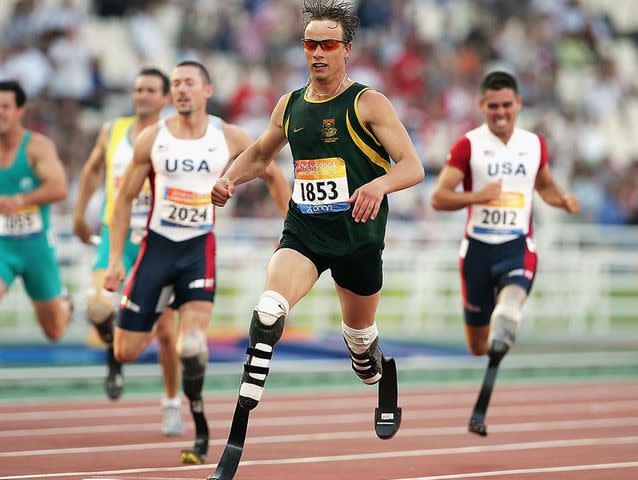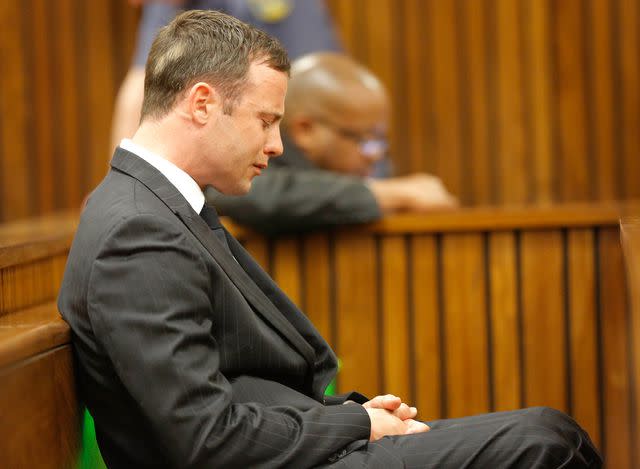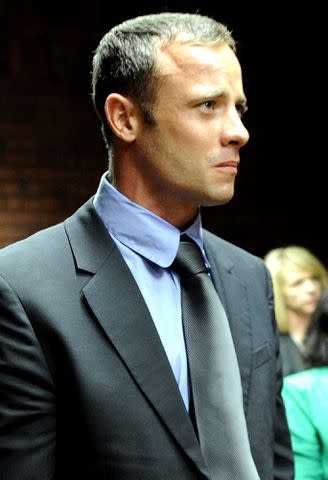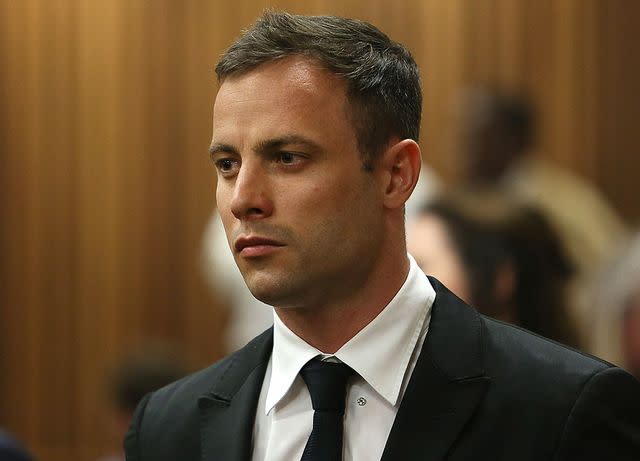Where Is Oscar Pistorius Now? Inside the Olympian’s Life After Murder Conviction
Oscar Pistorius was convicted of murder after shooting and killing his girlfriend Reeva Steenkamp

Themba Hadebe, File/AP
Oscar Pistorius leaves the High Court in Pretoria, South Africa, after his sentencing proceedings on June 15, 2016.Oscar Pistorius has been granted parole after serving nearly nine years in prison for the murder of his girlfriend Reeva Steenkamp.
The former Paralympic and Olympic athlete rose to international prominence in the early 2000s, breaking world records as a double-amputee sprinter. Pistorius' legs were amputated below the knee after he was born with a congenital defect that left him missing his fibular bones.
Despite his limb difference, Pistorius excelled in sports, and as a teenager, he became involved in track and field. He began competing as a sprinter, appearing in the Paralympic Games and other high-level championships — eventually earning the nickname “Blade Runner.” In 2008, he was granted permission to use his prosthetic legs in Olympic-level competition, and by 2012, he had earned a spot on the South African team at the Summer Olympics in London.
Only a year later, though, Pistorius became involved in a highly publicized murder trial. In the early hours of Feb. 14, 2013, Pistorius shot and killed Steenkamp, the model and law school graduate he was dating at the time. While he maintained that he mistakenly believed Steenkamp was an intruder and shot her in self-defense, prosecutors argued that he had intentionally killed her in the middle of a heated fight.
Over the next few years, Pistorius was put on trial for Steenkamp’s murder, at first being found guilty of culpable homicide, akin to manslaughter, in 2014. But the decision was overturned the following year, and he was convicted of murder, leading to a sentencing of over 13 years in jail. Before beginning his time in 2016, Pistorius said he understood why people thought he should be in jail.
“I did take Reeva’s life, and I have to live with it,” he said in an interview broadcast on REELZ. “I understand the pain people feel that loved her and miss her. I feel that same pain, I feel that same hate for myself, I feel that same difficulty in understanding this. And I look back and I think — I always think, how did this possibly happen?”
Pistorius spent nearly nine years of his sentence in jail before being released on parole in January 2024.
So what happened to Oscar Pistorius? Here are all the details about his life after prison.
Who is Oscar Pistorius?

Phil Cole/Getty
Oscar Pistorius of South Africa wins the 200m T44 for Men at the Athens 2004 Paralympic Games on September 21, 2004.Pistorius is a former professional athlete who gained fame as a sprinter in both the Paralympic and Olympic Games. Born in South Africa in 1986, Pistorius became a double-amputee at 11 months old due to fibular hemimelia in both of his legs, a congenital defect that causes the absence of the fibula.
Pistorius was fitted for prosthetic legs, and as a student, he began his athletic career. He played numerous sports, including water polo, tennis and wrestling, but didn’t begin running until the early 2000s. Speaking to The Telegraph, he explained that he picked up running after a sporting injury sidelined him.
“I only started sprinting in January 2004. I thought that I would be going back to the rugby season at school in April 2004, but started sprinting as part of my training after an injury, entered the South African disabled championships, and never looked back," he told the outlet in 2007.
Sprinting on state-of-the-art carbon-fiber blades known as Cheetahs, Pistorius took part in the Paralympic Games in Athens when he was 17. He went on to compete in numerous other championships and subsequent Paralympic Games, eventually campaigning for his ability to participate in the Olympics.
He took his case to the International Olympic Committee, and in 2007, he went through scientific testing to determine if his prosthetic legs gave him an advantage over non-disabled athletes, per The New York Times.
Although he was initially told his blades gave him an unfair advantage and were ineligible for use in competition, Pistorius filed an appeal to the Court of Arbitration for Sport. The decision was overturned, and he tried to qualify for South Africa’s team at the 2008 Summer Olympics in Beijing.
Although he did not qualify, Pistorius returned in 2012 and eventually became the first-ever amputee runner to compete at the Olympics.
Who was Reeva Steenkamp?

Stephanie Makhlouf/Heat Magazine/Gallo Images/Getty
Reeva Steenkamp attends her high tea birthday party at the Da Vinci Hotel on August 12, 2012 in Sandton, South Africa.Like Pistorius, his former girlfriend Steenkamp was born and raised in South Africa. When she was 15, she was scouted during a newspaper beauty contest and began a modeling career, per Sky News. Amidst taking on modeling jobs, Steenkamp graduated from college and obtained a bachelor of law degree from Nelson Mandela University.
She went on to work toward her master's degree in law and had plans to take the Bar exam but took a step back from her education to pursue modeling opportunities.
“At the end of last year I made an application to the Bar. It was a nerve-wracking experience," she told The Herald. "As I walked out I got the call for the FHM shoot as well as two others. I made a decision to take the modeling shoots. I believe in destiny and faith."
In addition to appearing in FHM magazine and television advertisements, she was a contestant on the BBC show Baking Made Easy. She also took part in the fifth season of Tropika Island of Treasure, which premiered days after her death.
What happened to Reeva Steenkamp?

Waldo Swiegers/Heat Magazine/Gallo Images/Getty
Oscar Pistorius and Reeva Steenkamp at the Tasha's All White Party on January 26, 2012 in Johannesburg, South Africa.In 2012, Steenkamp began dating Pistorius. Although they kept their relationship private at first, they confirmed their romance after appearing at the South Africa Sports Awards together in November. In the weeks that followed, Steenkamp shared snippets of their relationship on social media, including Instagram posts.
A few months into their relationship, Steenkamp was tragically shot and killed by Pistorius while spending the night at his home in Pretoria, South Africa. In the early hours of Feb. 14, 2013, Steenkamp entered the bathroom and locked the door shut. Shortly after, Pistorius fired several shots, fatally hitting his girlfriend three times — in the head, arm and hip, according to The Guardian.
Pistorius, who later claimed that he believed there was an intruder in the bathroom, then broke down the bathroom door and carried Steenkamp downstairs, where she ultimately died.
Did Oscar Pistorius admit to killing Reeva Steenkamp?

Kim Ludbrook, Pool/AP
Oscar Pistorius reacts as Judge Thokozile Masipa delivers her verdict in murder trial on Sept. 11, 2014 in Pretoria, South Africa.Following Steenkamp’s death, Pistorius was taken into police custody, and one day later, he was charged with premeditated murder, per Reuters. During his bail hearing on Feb. 19, 2013, Pistorius denied purposely killing Steenkamp, explaining that he had heard a strange noise coming from his bathroom and thought it was an intruder.
Pistorius recounted that he had woken up to move a fan and close a sliding door when he heard movement. The athlete, who admitted that he was fearful of “South Africa’s rampant violent crime,” said he “felt a sense of terror” when he realized someone was in the bathroom, according to The New York Times.
Believing that Steenkamp was still in bed, he grabbed his 9-millimeter pistol and headed toward the bathroom without using his prosthetic legs. He claims to have screamed for the intruder to “get out of my house” and for Steenkamp to call the police before firing into the locked room.
Pistorius says he returned to the bedroom, where he discovered that Steenkamp was not there and realized "it could have been" her in the bathroom. He eventually broke down the bathroom door with a cricket bat and attempted to help Steenkamp, calling for an ambulance and the head of security for the property.
“I tried to render the assistance to Reeva that I could, but she died in my arms. I am absolutely mortified by the events and the devastating loss of my beloved Reeva,” he said.
In his affidavit, he added, “I fail to understand how I could be charged with murder, let alone premeditated. I had no intention to kill my girlfriend.”
Pistorius continued to maintain his innocence throughout his subsequent murder trials. A witness in the court case also alleged that Pistorius had claimed to be innocent in the moments directly after the shooting. Dr. Johan Stipp, a nearby neighbor, was woken up by the gunshots and went to Pistorius’ home to investigate, where he found the athlete kneeling over Steenkamp’s body.
“I remember the first thing he said when I got there was: ‘I shot her. I thought she was a burglar. I shot her,’ ” he recalled in court, per The Guardian. “While I was trying to ascertain if she’s revivable, Oscar was crying all the time. ... He said at one stage while he was praying that he will dedicate his life and her life to God if she would just only live and not die that night.”
Was Oscar Pistorius convicted for Reeva Steenkamp’s murder?

STEPHANE DE SAKUTIN/AFP/Getty
Oscar Pistorius appears on February 19, 2013 at the Magistrate Court in Pretoria, South Africa.Pistorius’ first murder trial began over a year after Steenkamp’s death in March 2014. In court, Pistorius claimed to have acted in self-defense and that he did not intentionally murder Steenkamp. Meanwhile, the prosecution alleged that the murder was premeditated and Pistorius had purposely shot Steenkamp following an argument during which she had locked herself in the bathroom.
During the trial, the prosecution brought forth several witnesses from Pistorius’ neighborhood, including one who claimed to have heard “blood curdling screams” on the night of the shooting, followed by four shots, per The Washington Post.
In response, Pistorius’ attorney, Barry Roux, suggested the screams were actually Pistorius. Numerous other neighbors claimed to have heard screaming, but an acoustic engineer testified that people’s ability to differentiate between a man and a woman screaming is not always reliable, according to News24.
Pistorius’ ex-girlfriend Samantha Taylor also took the stand and shared that she was 17 when they began dating. She said that she often stayed over at his home — until Pistorius ended the relationship to be with Steenkamp.
During her testimony, she characterized Pistorius as having a temper and revealed that he had been involved in numerous gun-related incidents during their relationship. She also disagreed that the screams coming from the scene of the crime could have been Pistorius because he had “often screamed” at her and “he sounds like a man," per The Independent.
Sean Patrick Rens, who had once sold Pistorius a handgun, also took the stand, claiming that the athlete had ordered six more guns from him before the murder, according to BBC. He also recalled a previous incident where Pistorius had told him he believed there was an intruder in his home and went into “combat mode” with his gun — only to discover it was his washing machine making noise.
Pistorius and Steenkamp’s WhatsApp text messages were also taken into consideration during the trial. While a majority of their messages were ordinary, several arguments were highlighted, per CNN.
In the weeks before Steenkamp’s murder, she called Pistorius “nasty” in a lengthy message, admitting she was “scared of [him] sometimes" and his ability to “snap” at her. Then, only a week before her death, she expressed her disappointment that he had lost his temper at an event and loudly criticized her in front of others.
Throughout the extensive trial, 37 witnesses out of a possible 107 were called to the stand, according to CBS News. As there are no juries in South Africa, the final verdict was left up to Judge Thokozile Masipa, who found Pistorius guilty of culpable homicide in September 2014. The following month, he was sentenced to five years in prison.
Was Oscar Pistorius’ sentencing appealed?

Alon Skuy/The Times/Gallo Images/Getty
Oscar Pistorius attends his sentencing hearing in the Pretoria High Court on October 16, 2014.Shortly after Pistorius was sentenced, the prosecution filed to appeal against the conviction, explaining that the punishment was “shockingly light” and “inappropriate,” per The Guardian.
The date for the appeal hearing was set for November 2015 — but leading up to that time, Pistorius became eligible for parole, having served a sixth of his sentence. After going through several delays, Pistorius was released on October 19 and approved to serve the rest of his sentence on house arrest under correctional supervision.
Meanwhile, the appeal moved forward, and in December, South Africa’s Supreme Court of Appeal, composed of a five-judge panel, heard the case. In a unanimous decision, the panel overturned the original verdict, entering a conviction of murder.
According to the judges, the lower court had “misapplied the principle of ‘dolus eventualis,’ ” per NBC News, and parts of the evidence were “seemingly ignored by the trial court.” Justice Lorimer Eric Leach added that Pistorius had “never offered an acceptable explanation” for shooting Steenkamp.
The case was then sent to South Africa’s High Court, and in 2016, Pistorius was sentenced to six years in prison for murder — a ruling that was deemed “shockingly lenient” by the South African appellate court.
Then, in 2017, Pistorius was ordered to spend additional time in jail, bringing his total time behind bars to 13 years and five months. The new sentence would bring Pistroius’ jail time in line with the recommended minimum of 15 years for murder in South Africa.
Is Oscar Pistorius out on parole?

Themba Hadebe, Pool/AP
Oscar Pistorius arrives for his trial at the high court in Pretoria, South Africa on March 3, 2014.In March 2023, Pistorius became eligible for parole after serving half his 13-year sentence and participating in the Restorative Justice process, which included speaking with Steenkamp’s family and asking for forgiveness. After a hearing, the request for parole was denied.
“The reason provided is that the inmate did not complete the minimum Detention Period as ruled by the Supreme Court of Appeal,” a news release stated.
Despite the denial, later that same year, the Department of Correctional Services in South Africa announced that the parole board had set Pistorius’ release for Jan. 5, 2024.
“Parole placement forms part of the total rehabilitation programme in correcting offending behavior and may include continuation of programmes aimed at reintegration whilst in the system of community corrections,” a statement added.
In January 2024, Pistorius was released from Atteridgeville Correctional Center under parole, having served nearly nine years of his sentence, per the Associated Press.
Where is Oscar Pistorius now?

Pistorius' release was strategically planned to avoid media attention, quietly leaving the correctional center in January, and he has remained under the radar since.
He lives with his uncle, Arnold Pistorius, in the Pretoria suburb of Waterkloof, PEOPLE reported. He previously stayed there while on trial in 2014, having sold the house where he killed Steenkamp in order to pay legal bills.
According to a press release by the Department of Correctional Services, there are restrictions on when he can leave his home, and he is not allowed to leave the Waterkloof district without permission.
Pistorius is also not permitted to speak to the media, but his lawyer Julian Knight told PEOPLE that his parole conditions allow “limited time in the week to attend work commitments and church on Sunday."
Per the Associated Press, he must attend therapy sessions as well as programs on anger management and violence against women. Additionally, he must complete community service hours and will regularly meet with parole officials. He will also be subjected to unannounced visits from authorities until his sentence expires in 2029.
For more People news, make sure to sign up for our newsletter!
Read the original article on People.


